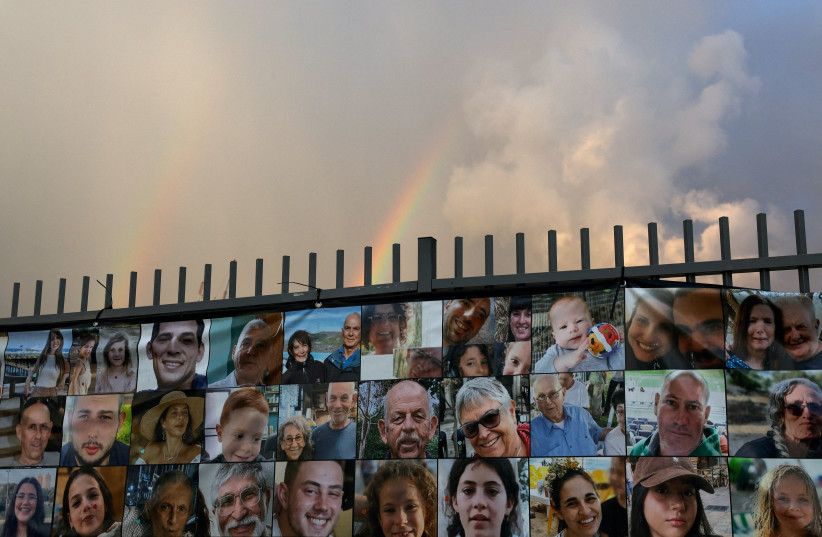The government issued a proclamation disavowing unilateral Palestinian statehood, which the Knesset is expected to ratify Monday, as Israel hardened its stance against attempts by Western countries to issue such a recognition.
“One thing Israel cannot agree to is an international diktat that would seek to unilaterally recognize a Palestinian state, basically force a Palestinian state on Israel after the horror of October 7,” Prime Minister Benjamin Netanyahu told the Conference of Presidents in Jerusalem on Sunday night.
US Ambassador to Israel Jack Lew was in the room as Netanyahu described to the Jewish-American leaders how the government at its weekly meeting that afternoon unanimously approved a statement detailing its position on unilateralism.
Israel's stance on a future with Palestinians
“Israel utterly rejects international diktats regarding a permanent settlement with the Palestinians. A settlement, if it is to be reached, will come about solely through direct negotiations between the parties, without preconditions,” Netanyahu said as he read out, word-for-word, the text of the government proclamation.
“Israel will continue to oppose unilateral recognition of a Palestinian state. Such recognition in the wake of the October 7th massacre would be a massive and unprecedented reward to terrorism and would prevent any future peace settlement,” Netanyahu stated to applaud from the audience.

“You should know that the people of Israel are really united on this,” he said, as he asked the Conference of Presidents to also affirm the statement.
Netanyahu’s statement and the government vote marks the third time in as many days that the Prime Minister has spoken out about this issue, which was also discussed by the security cabinet on Thursday night.
Finance Minister Bezalel Smotrich (Religious Zionist Party) demanded that the security cabinet and or the government take such a step as European countries have weighed unilateral statehood declarations and the US has pushed for a two-state resolution to the conflict as part of its renewed push for an Israeli-Saudi normalization deal.
At the Conference of Presidents, which gathered at the Museum of Tolerance, Lew was asked if the Biden Administration planned to unilaterally recognize Palestinian statehood.
“We have never said that was our policy,” Lew told the Conference of Presidents. “Our policy is that there should be an over-the-horizon process” toward Palestinian statehood that involved Israel, said Lew, who took up his post in October and rarely makes public speeches.
He advocated for the advancement of a normalization deal with Saudi Arabia that would include a two-state option.
“Now is a moment in time where there is a real possibility that by engaging with normalization negotiations with Saudi Arabia and engaging in a process of working to reform, revamp and revitalize the Palestinian Authority, that there can be a demilitarized Palestinian state that could live side by side in peace” with Israel, said Lew.
“But Israel will have to make that choice. Israel will have to find a balance between different things that are important or cause concern,” he said.
“If the value of having normalization” with Saudi Arabia is “as important as I think it is,” it will force a conversation in Israel about this, Lew said.
The issue of Palestinian statehood has been one of the points of contention between Israel and the Biden administration, with the US wanting Israel to affirm its commitment to a Palestinian state, while many in the Israeli government have actively spoken against any Palestinian statehood process.
In the aftermath of the Israel-Hamas war, however, the issue of Palestinian statehood has become a critical part of the push for a two-part deal, that includes a defense pact between Riyadh and Washington and a normalization deal between Israeli and Saudi Arabia.
The Palestinian Authority has asked that unilateral Palestinian statehood be the starting gate of that process and not the endpoint.
Lew told the audience that “the US remains determined to pursue a diplomatic path to a just and lasting peace, with security for Israel and for all in the region.
“That future of peace and security is part of a vision we believe is within reach,” Lew said.
“It includes an Israel that is fully integrated into the region, with normal relations with key countries, including Saudi Arabia, and firm guarantees for its long term security.
Arab countries with diplomatic ties with Israel and those who could make peace with Israel are key to the process, including the economic revitalization of Gaza that will need to follow this war, Lew said.
“Their involvement also depends on addressing the aspirations of Palestinians for a better future.
“There must be an over the horizon process that includes a vision for a demilitarized Palestinian state,” Lew said.
Lew told the Conference of Presidents that the Saudi deal was also important in light of the larger conflict with Iran because such a step would help isolate the Islamic Regime in the region.
